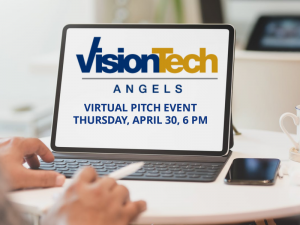If you’ve been looking for a bright spot during the COVID-19 lockdown, I’ve got two for you. VisionTech Angels has decided not to cancel our April pitch event. Instead, we’ve replaced our five-city, two-state tour with a single on-line pitch event on Thursday, April 30. Thank you Zoom! The second bright spot is that Haley Marie Keith, co-founder and CEO of MITO Materials, has accepted our invitation to pitch. She joins Jana Fuelberth, president and co-founder of analytic.li, on our virtual pitch roster. MITO’s lead product is a proprietary chemical additive that is proving to be a hot commodity among end users as well as suppliers of specialty chemicals. Since relocating to Indiana from Oklahoma seven months ago, MITO has doubled its customer pipeline. If you think that’s impressive, you’ll want to read our entire conversation to see what’s next for this dynamic startup.

BP: Tell me about how MITO Materials came to be and the market problem you’re solving.
HK: I grew up in Elkhart, Indiana, the RV capital of the world. I remember hearing horror stories on sidewall delamination where the exterior fiberglass layer of the RV separates from the wood or metal beneath, forming bubbles and creases. It’s a huge industry problem. During the first class of my MBA at Oklahoma State University, I was introduced to what became MITO’s lead technology and immediately recognized it as a solution for RV manufacturers. As part of my MBA, I worked with the students behind the technology on a business plan. During the market discovery phase, I was happily surprised to find out it had great potential across multiple industries. So my co-founder and I licensed the patents from Oklahoma State University to commercialize the technology and launch a company.
BP: What is your unique value proposition?
HK: MITO manufactures chemical additives for polymer composite manufacturers seeking superior performance, flexibility and durability. Our flagship product enhances toughness up to 60 percent and increases glass transition temperatures in coatings, sealants, adhesives, and elastomers (CASE) applications and fiber-reinforced thermoplastics. These attributes are extremely important to industries that are looking to lightweight their products or components within their products without sacrificing performance. This includes the aerospace, automotive, boat, tractor-trailer, and wind turbine industries. There’s also a sustainability component. Light weighting reduces fuel consumption, which in turn reduces carbon emissions.
BP: What types of companies and industries are MITO’s ideal customers?
HK: Right now, our ideal customers are composite manufacturers or material compounders. These companies have immediate needs for enhanced material performance and have the ability to move quickly. In the long term, our ideal customers are the larger chemical and specialty formulators because the volumes are exponentially higher. At this time, MITO’s pipeline includes customers from our benchmark and long-term markets, five of which are large multi-national specialty chemical companies, similar to Henkel, Dow and PPG.

BP: What does the competitive landscape look like?
HK: I know investors don’t like startups to say they’re unique, but our hybrid additive technology is truly novel and is protected by two patents, with additional patents pending. There are competing technologies such as carbon nanotubes and nanosilica used primarily in CASE applications. Here’s the difference: MITO additives deliver more toughness using 400 times less material than our leading competitor. Our product is also non-toxic, safe to handle, and requires no changes to existing manufacturing processes common to the industries we serve.
BP: How does this impact pricing and your revenue model?
HK: Good question! MITO’s pricing is volume based and thus is higher than competing technologies. However, because customers use so much less of our product to achieve the desired performance attributes, the price differential is a wash. Some industries do have cost sensitivities so in addition to selling direct to customers; we’re also looking at licensing opportunities.
BP: What is MITO’s traction to date?
HK: Since relocating to Indianapolis from Oklahoma in September 2019, we’ve experienced exponential growth as companies that can benefit from our product are in our backyard instead of across the country. Our pipeline doubled based on our new Midwest headquarters and our Techstars experience through The Heritage Group that plugged us into Techstars’ global network. In all, our sales pipeline has 20 potential customers in different stages of the pilot sales funnel. What’s remarkable is these customers were acquired with no direct marketing expenses or targeted business development efforts.
BP: How big is this investment round and how will funds be used?
HK: We are currently raising $500,000 on a convertible note. These funds will be used in three key areas: business development, product development and integration, and general and administrative expenses. A top priority is completing pilot projects with five customers and once we secure market validation, converting them to recurring customers and using the experience to build a repeatable, scalable marketing strategy. From a product development standpoint, we are working with our contract manufacturer, Monument Chemical, to demonstrate we can manufacture to scale. Of course, some of the funds will be directed to filing provisional patents on new discoveries. A small portion with support our operations in Indiana and Oklahoma, where our lab resides.
BP: The COVID-19 pandemic is likely to cause sweeping changes across industries. How does MITO fit in the new normal? HK: We’re already seeing national dialogue focus on the need to bring more manufacturing home to America. The demand for innovation in product and process design as well as materials will be greater than ever. This will create new opportunities for advanced materials such as MITO’s. Since the COVID-19 lockdown began, we’ve shifted our focus on internal components of our company such as pursuing additional patents and applying for grant funding to evaluate our material in recycled thermoplastics, personal protection equipment and potentially medical equipment, which could benefit from our product’s antimicrobial properties. Raising money now means that we can move forward with these applications faster.
 BP: Why should VisionTech Angels invest in your company?
BP: Why should VisionTech Angels invest in your company?
HK: There are three reasons for investing in MITO now. First, the National Science Foundation has committed to matching dollars in this round with an additional $500,000 in nondilutive funding to support R&D. Second, we have a straightforward cap table. The majority of our funding to date has come from grants totaling $2 million. Finally, MITO is well positioned in our market. Our technology works and we have new variations in our pipeline that offer as much, or more value to specific industries. The fact that we have solid traction with customers, channel partners, and suppliers is a testament to this opportunity.
To learn more about MITO Materials visit their website. VisionTech Angels’ April 30 Virtual Pitch Event is open to our members and accredited investors interested in joining our group. Register for the event by emailing Ben Pidgeon at bpidgeon@visiontech-partners.com.